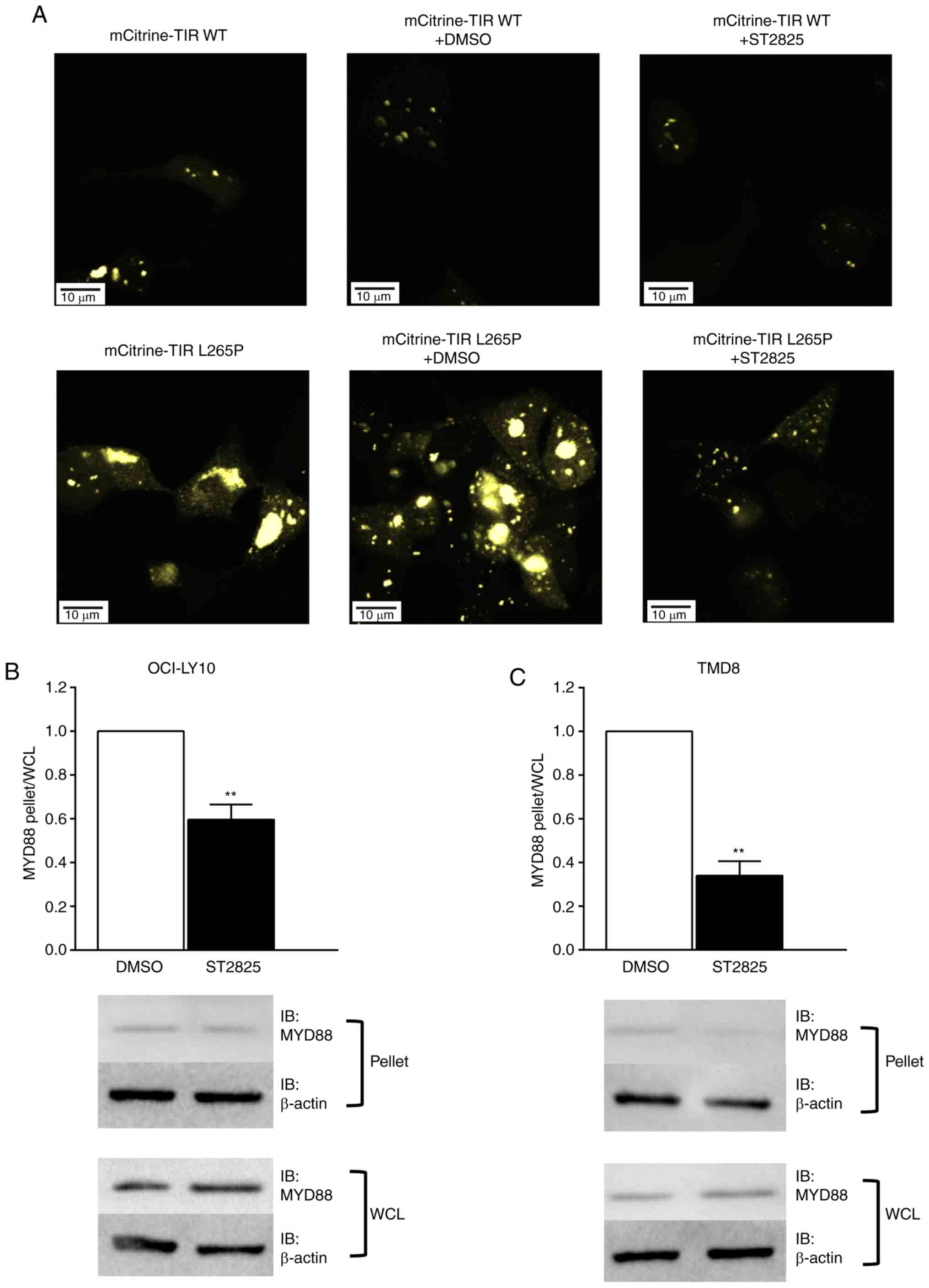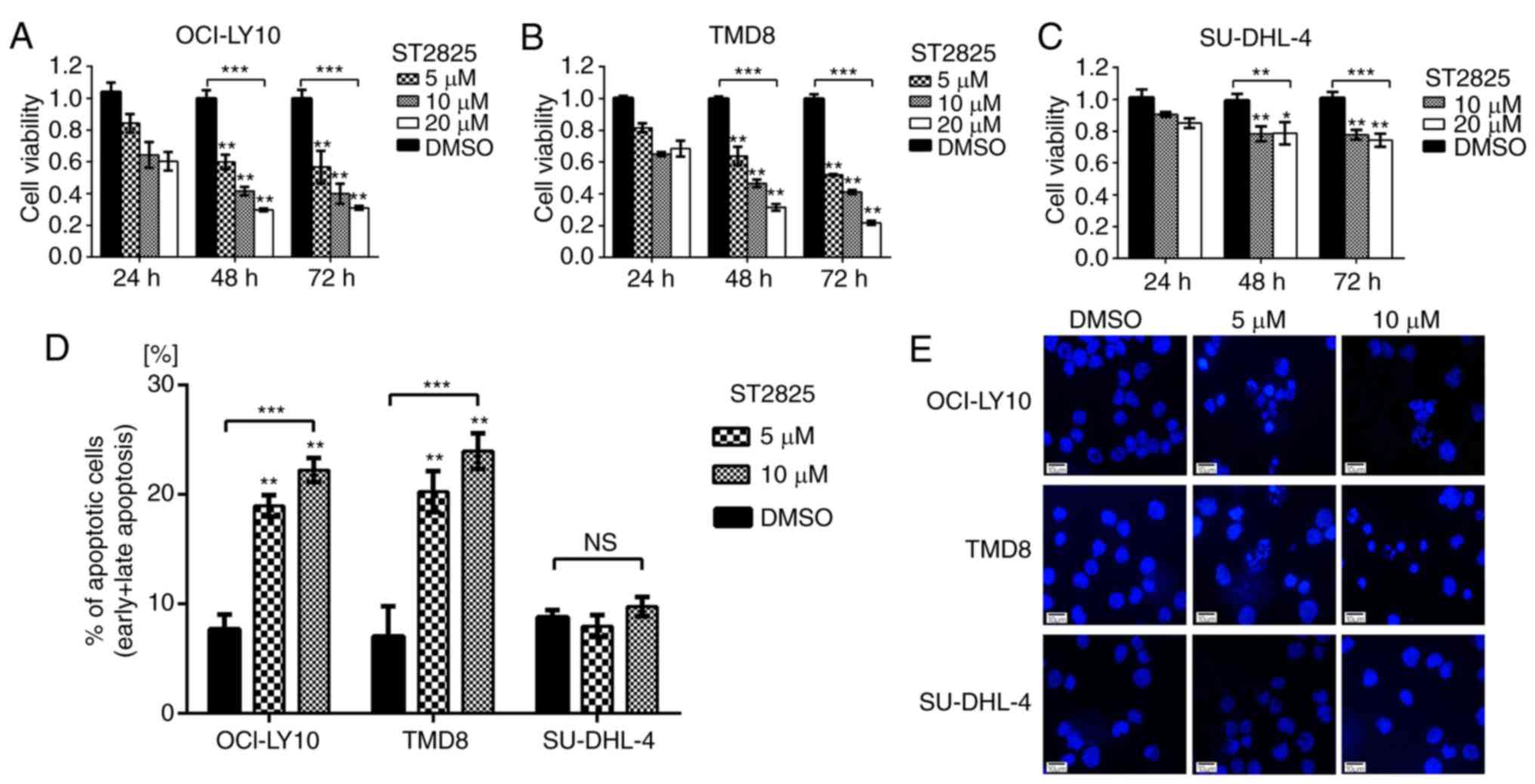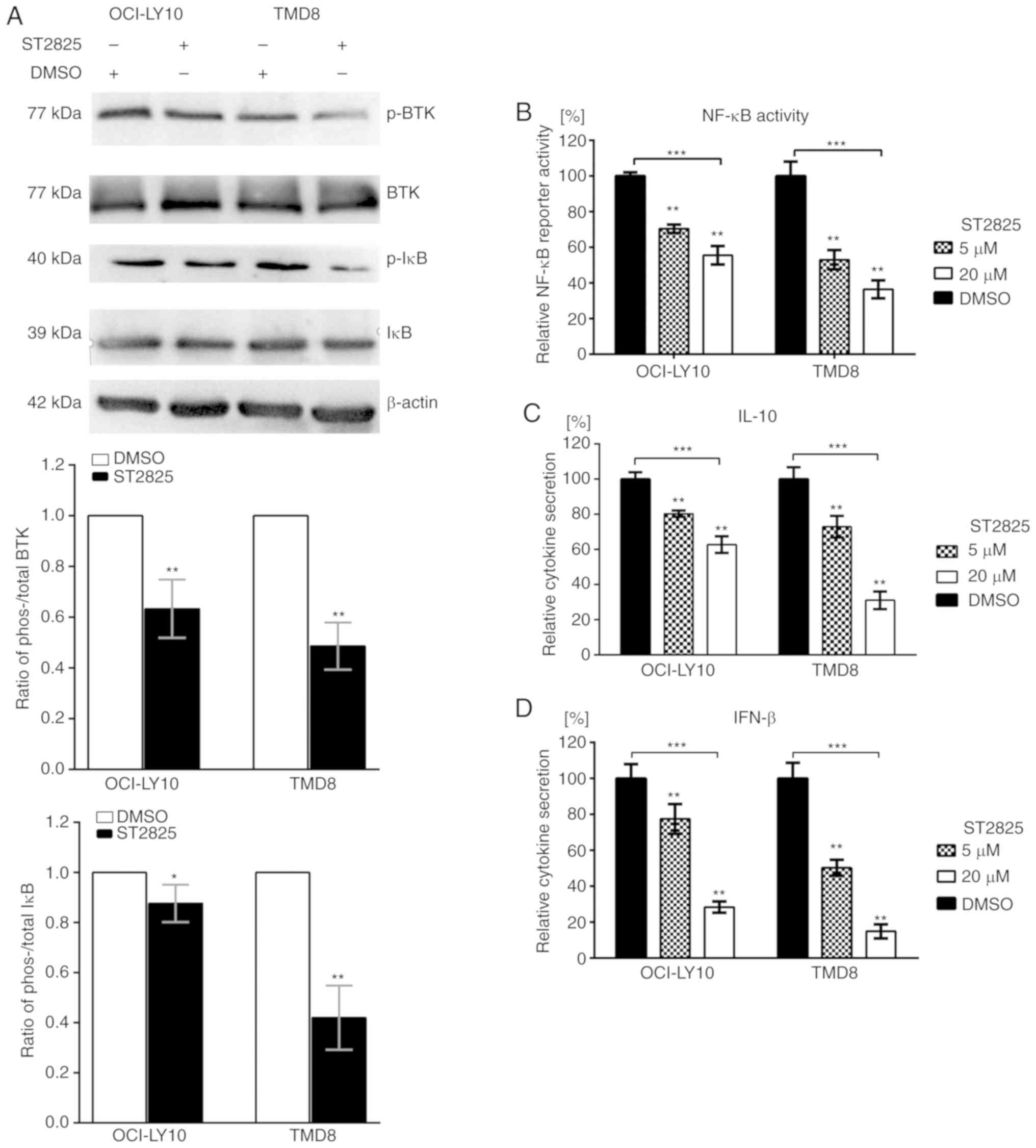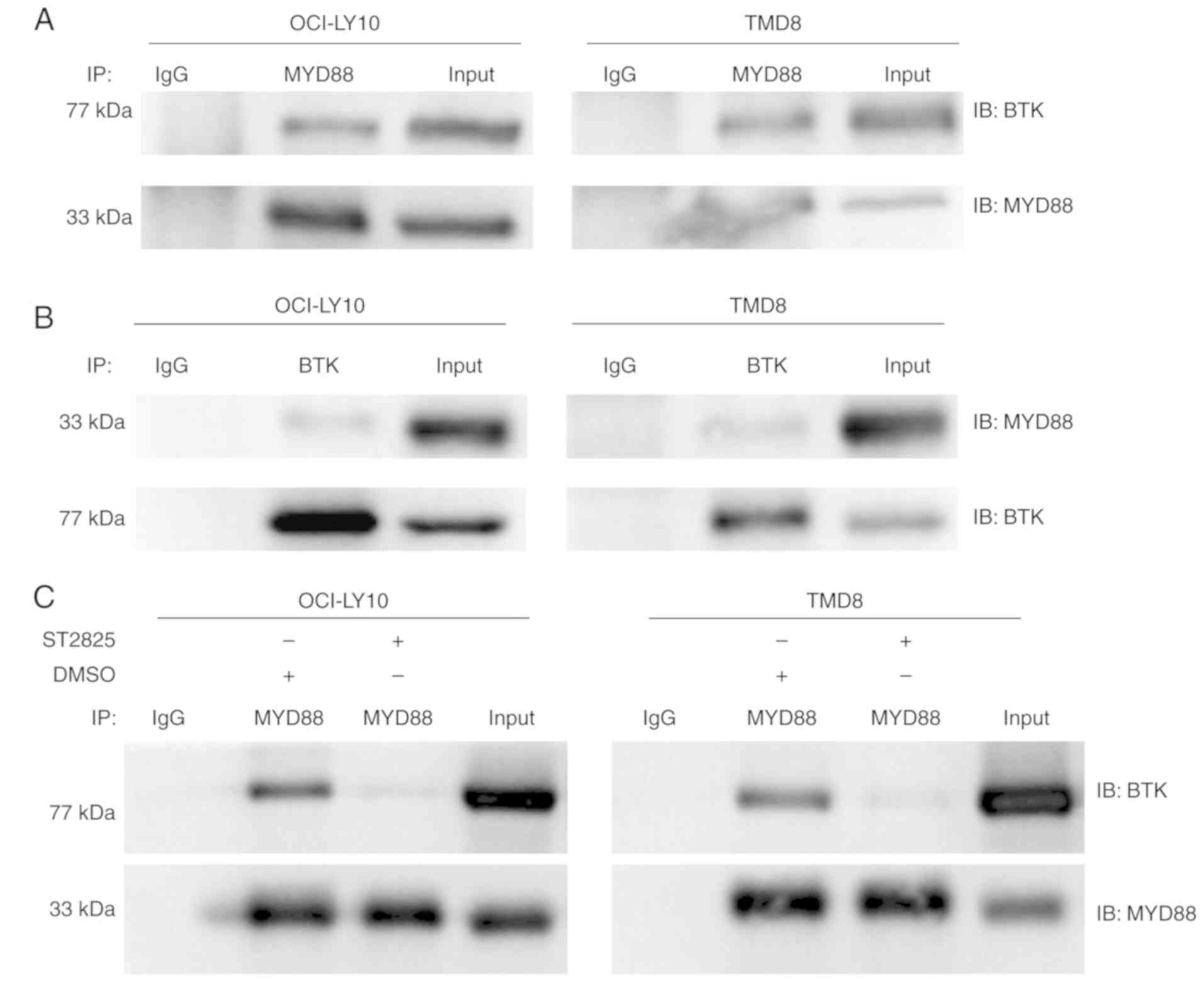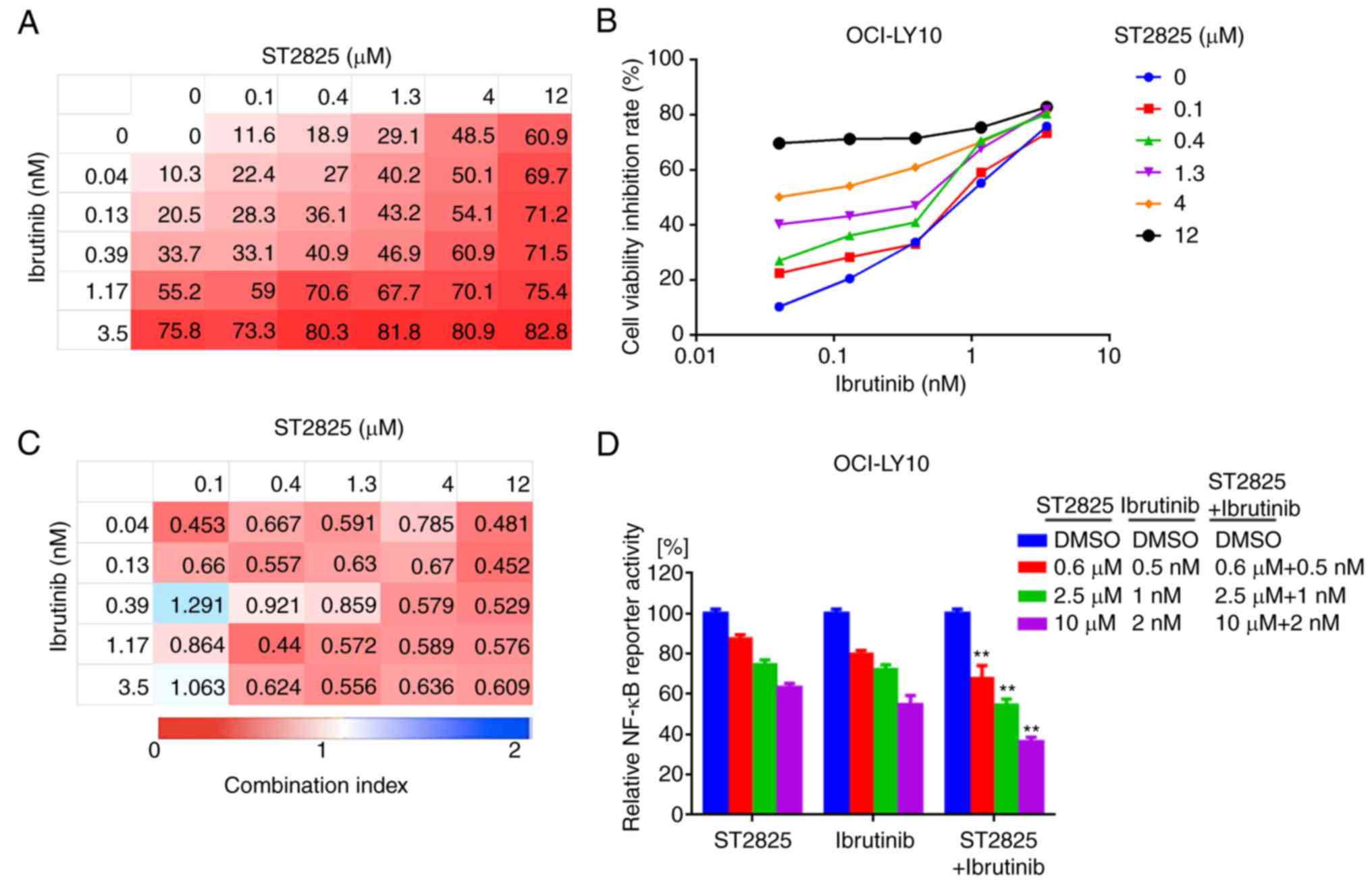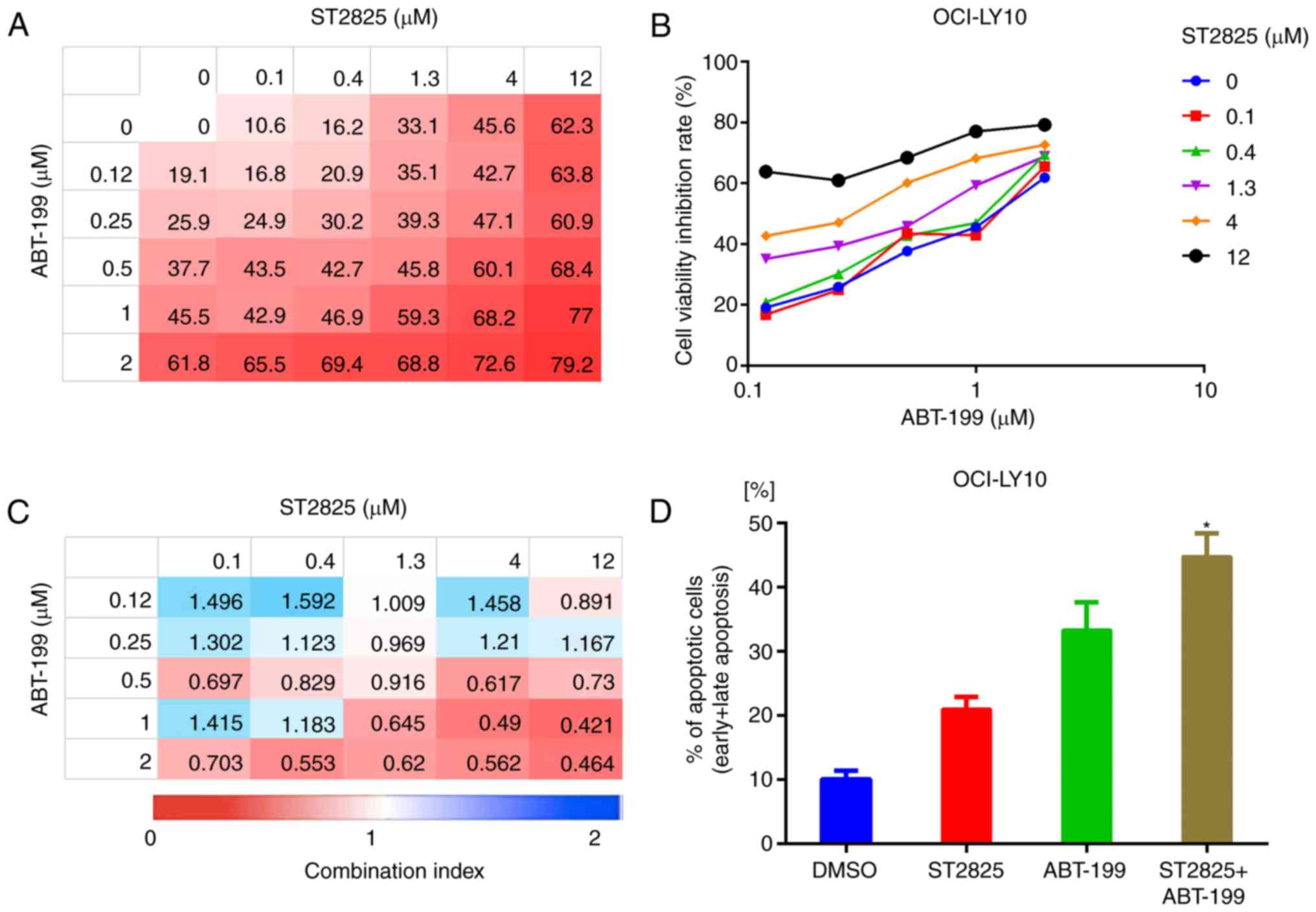|
1
|
Teras LR, DeSantis CE, Cerhan JR, Morton
LM, Jemal A and Flowers CR: 2016 US lymphoid malignancy statistics
by World Health Organization subtypes. CA Cancer J Clin.
66:443–459. 2016. View Article : Google Scholar : PubMed/NCBI
|
|
2
|
Bray F, Ferlay J, Soerjomataram I, Siegel
RL, Torre LA and Jemal A: Global cancer statistics 2018: GLOBOCAN
estimates of incidence and mortality worldwide for 36 cancers in
185 countries. CA Cancer J Clin. 68:394–424. 2018. View Article : Google Scholar : PubMed/NCBI
|
|
3
|
Alizadeh AA, Eisen MB, Davis RE, Ma C,
Lossos IS, Rosenwald A, Boldrick JC, Sabet H, Tran T, Yu X, et al:
Distinct types of diffuse large B-cell lymphoma identified by gene
expression profiling. Nature. 403:503–511. 2000. View Article : Google Scholar : PubMed/NCBI
|
|
4
|
Pfreundschuh M, Kuhnt E, Trümper L,
Osterborg A, Trneny M, Shepherd L, Gill DS, Walewski J, Pettengell
R, Jaeger U, et al: CHOP-like chemotherapy with or without
rituximab in young patients with good-prognosis diffuse
large-B-cell lymphoma: 6-year results of an open-label randomised
study of the MabThera International Trial (MInT) Group. Lancet
Oncol. 12:1013–1022. 2011. View Article : Google Scholar : PubMed/NCBI
|
|
5
|
Rawlings DJ, Schwartz MA, Jackson SW and
Meyer-Bahlburg A: Integration of B cell responses through Toll-like
receptors and antigen receptors. Nat Rev Immunol. 12:282–294. 2012.
View Article : Google Scholar : PubMed/NCBI
|
|
6
|
Davis RE, Ngo VN, Lenz G, Tolar P, Young
RM, Romesser PB, Kohlhammer H, Lamy L, Zhao H, Yang Y, et al:
Chronic active B-cell-receptor signalling in diffuse large B-cell
lymphoma. Nature. 463:88–92. 2010. View Article : Google Scholar : PubMed/NCBI
|
|
7
|
Lenz G, Davis RE, Ngo VN, Lam L, George
TC, Wright GW, Dave SS, Zhao H, Xu W, Rosenwald A, et al: Oncogenic
CARD11 mutations in human diffuse large B cell lymphoma. Science.
319:1676–1679. 2008. View Article : Google Scholar : PubMed/NCBI
|
|
8
|
Ngo VN, Young RM, Schmitz R, Jhavar S,
Xiao W, Lim KH, Kohlhammer H, Xu W, Yang Y, Zhao H, et al:
Oncogenically active MYD88 mutations in human lymphoma. Nature.
470:115–119. 2011. View Article : Google Scholar : PubMed/NCBI
|
|
9
|
Medzhitov R, Preston-Hurlburt P and
Janeway CA Jr: A human homologue of the Drosophila Toll protein
signals activation of adaptive immunity. Nature. 388:394–397. 1997.
View Article : Google Scholar : PubMed/NCBI
|
|
10
|
Ntoufa S, Vilia MG, Stamatopoulos K, Ghia
P and Muzio M: Toll-like receptors signaling: A complex network for
NF-κB activation in B-cell lymphoid malignancies. Semin Cancer
Biol. 39:15–25. 2016. View Article : Google Scholar : PubMed/NCBI
|
|
11
|
Lin SC, Lo YC and Wu H: Helical assembly
in the MyD88-IRAK4-IRAK2 complex in TLR/IL-1R signalling. Nature.
465:885–890. 2010. View Article : Google Scholar : PubMed/NCBI
|
|
12
|
Yu X, Li W, Deng Q, Li L, His ED, Young
KH, Zhang M and Li Y: MYD88 L265P mutation in lymphoid
malignancies. Cancer Res. 78:2457–2462. 2018. View Article : Google Scholar : PubMed/NCBI
|
|
13
|
Avbelj M, Wolz OO, Fekonja O, Benčina M,
Repič M, Mavri J, Krüger J, Schärfe C, Delmiro Garcia M, Panter G,
et al: Activation of lymphoma-associated MyD88 mutations via
allostery-induced TIR-domain oligomerization. Blood. 124:3896–3904.
2014. View Article : Google Scholar : PubMed/NCBI
|
|
14
|
Loiarro M, Capolunghi F, Fantò N, Gallo G,
Campo S, Arseni B, Carsetti R, Carminati P, De Santis R, Ruggiero V
and Sette C: Pivotal advance: Inhibition of MyD88 dimerization and
recruitment of IRAK1 and IRAK4 by a novel peptidomimetic compound.
J Leukoc Biol. 82:801–810. 2007. View Article : Google Scholar : PubMed/NCBI
|
|
15
|
Li H, Huang Z, Gao M, Huang N, Luo Z, Shen
H, Wang X, Wang T, Hu J and Feng W: Inhibition of YAP suppresses
CML cell proliferation and enhances efficacy of imatinib in vitro
and in vivo. J Exp Clin Cancer Res. 35:1342016. View Article : Google Scholar : PubMed/NCBI
|
|
16
|
Chou TC: Drug combination studies and
their synergy quantification using the Chou-Talalay method. Cancer
Res. 70:440–446. 2010. View Article : Google Scholar : PubMed/NCBI
|
|
17
|
Wilson WH, Young RM, Schmitz R, Yang Y,
Pittaluga S, Wright G, Lih CJ, Williams PM, Shaffer AL, Gerecitano
J, et al: Targeting B cell receptor signaling with ibrutinib in
diffuse large B cell lymphoma. Nat Med. 21:922–926. 2015.
View Article : Google Scholar : PubMed/NCBI
|
|
18
|
Jefferies CA, Doyle S, Brunner C, Dunne A,
Brint E, Wietek C, Walch E, Wirth T and O'Neill LA: Bruton's
tyrosine kinase is a Toll/interleukin-1 receptor domain-binding
protein that participates in nuclear factor kappaB activation by
Toll-like receptor 4. J Biol Chem. 278:26258–26264. 2003.
View Article : Google Scholar : PubMed/NCBI
|
|
19
|
Liu X, Zhan Z, Li D, Xu L, Ma F, Zhang P,
Yao H and Cao X: Intracellular MHC class II molecules promote
TLR-triggered innate immune responses by maintaining activation of
the kinase Btk. Nat Immunol. 12:416–424. 2011. View Article : Google Scholar : PubMed/NCBI
|
|
20
|
Phelan JD, Young RM, Webster DE, Roulland
S, Wright GW, Kasbekar M, Shaffer AL III, Ceribelli M, Wang JQ,
Schmitz R, et al: A multiprotein supercomplex controlling oncogenic
signalling in lymphoma. Nature. 560:387–391. 2018. View Article : Google Scholar : PubMed/NCBI
|
|
21
|
Cory S and Adams JM: The Bcl2 family:
Regulators of the cellular life-or-death switch. Nat Rev Cancer.
2:647–656. 2002. View
Article : Google Scholar : PubMed/NCBI
|
|
22
|
Lenz G, Wright GW, Emre NC, Kohlhammer H,
Dave SS, Davis RE, Carty S, Lam LT, Shaffer AL, Xiao W, et al:
Molecular subtypes of diffuse large B-cell lymphoma arise by
distinct genetic pathways. Proc Natl Acad Sci USA. 105:13520–13525.
2008. View Article : Google Scholar : PubMed/NCBI
|
|
23
|
Iqbal J, Neppalli VT, Wright G, Dave BJ,
Horsman DE, Rosenwald A, Lynch J, Hans CP, Weisenburger DD, Greiner
TC, et al: BCL2 expression is a prognostic marker for the activated
B-cell-like type of diffuse large B-cell lymphoma. J Clin Oncol.
24:961–968. 2006. View Article : Google Scholar : PubMed/NCBI
|
|
24
|
Davids MS: Targeting BCL-2 in B-cell
lymphomas. Blood. 130:1081–1088. 2017. View Article : Google Scholar : PubMed/NCBI
|
|
25
|
Chapuy B, Stewart C, Dunford AJ, Kim J,
Kamburov A, Redd RA, Lawrence MS, Roemer MGM, Li AJ, Ziepert M, et
al: Molecular subtypes of diffuse large B cell lymphoma are
associated with distinct pathogenic mechanisms and outcomes. Nat
Med. 24:679–690. 2018. View Article : Google Scholar : PubMed/NCBI
|
|
26
|
Schmitz R, Wright GW, Huang DW, Johnson
CA, Phelan JD, Wang JQ, Roulland S, Kasbekar M, Young RM, Shaffer
AL, et al: Genetics and pathogenesis of diffuse large B-cell
lymphoma. N Engl J Med. 378:1396–1407. 2018. View Article : Google Scholar : PubMed/NCBI
|
|
27
|
Fernández-Rodríguez C, Bellosillo B,
García-García M, Sánchez-González B, Gimeno E, Vela MC, Serrano S,
Besses C and Salar A: MYD88 (L265P) mutation is an independent
prognostic factor for outcome in patients with diffuse large B-cell
lymphoma. Leukemia. 28:2104–2106. 2014. View Article : Google Scholar : PubMed/NCBI
|
|
28
|
Weber ANR, Cardona Gloria Y, Çınar Ö,
Reinhardt HC, Pezzutto A and Wolz OO: Oncogenic MYD88 mutations in
lymphoma: Novel insights and therapeutic possibilities. Cancer
Immunol Immunother. 67:1797–1807. 2018. View Article : Google Scholar : PubMed/NCBI
|
|
29
|
Janz S: Mouse model of
MYD88L265P-dependent DLBCL. Blood. 127:2660–2661. 2016. View Article : Google Scholar : PubMed/NCBI
|
|
30
|
Knittel G, Liedgens P, Korovkina D, Seeger
JM, Al-Baldawi Y, Al-Maarri M, Fritz C, Vlantis K, Bezhanova S,
Scheel AH, et al: B-cell-specific conditional expression of
Myd88p.L252P leads to the development of diffuse large B-cell
lymphoma in mice. Blood. 127:2732–2741. 2016. View Article : Google Scholar : PubMed/NCBI
|
|
31
|
Hardiman G, Rock FL, Balasubramanian S,
Kastelein RA and Bazan JF: Molecular characterization and modular
analysis of human MyD88. Oncogene. 13:2467–2475. 1996.PubMed/NCBI
|
|
32
|
Fekonja O, Benčina M and Jerala R:
Toll/interleukin-1 receptor domain dimers as the platform for
activation and enhanced inhibition of Toll-like receptor signaling.
J Biol Chem. 287:30993–31002. 2012. View Article : Google Scholar : PubMed/NCBI
|
|
33
|
Jing X, Tian Z, Gao P, Xiao H, Qi X, Yu Y,
Ding X, Yang L and Zong L: HBsAg/β2GPI activates the NF-κB pathway
via the TLR4/MyD88/IkBα axis in hepatocellular carcinoma. Oncol
Rep. 40:1035–1045. 2018.PubMed/NCBI
|
|
34
|
Wang JQ, Jeelall YS, Beutler B, Horikawa K
and Goodnow CC: Consequences of the recurrent MYD88(L265P) somatic
mutation for B cell tolerance. J Exp Med. 211:413–426. 2014.
View Article : Google Scholar : PubMed/NCBI
|
|
35
|
Vyncke L, Bovijn C, Pauwels E, Van Acker
T, Ruyssinck E, Burg E, Tavernier J and Peelman F: Reconstructing
the TIR side of the myddosome: A paradigm for TIR-TIR interactions.
Structure. 24:437–447. 2016. View Article : Google Scholar : PubMed/NCBI
|
|
36
|
Ohnishi H, Tochio H, Kato Z, Orii KE, Li
A, Kimura T, Hiroaki H, Kondo N and Shirakawa M: Structural basis
for the multiple interactions of the MyD88 TIR domain in TLR4
signaling. Proc Natl Acad Sci USA. 106:10260–10265. 2009.
View Article : Google Scholar : PubMed/NCBI
|
|
37
|
Pasqualucci L and Zhang B: Genetic drivers
of NF-κB deregulation in diffuse large B-cell lymphoma. Semin
Cancer Biol. 39:26–31. 2016. View Article : Google Scholar : PubMed/NCBI
|
|
38
|
Yang G, Zhou Y, Liu X, Xu L, Cao Y,
Manning RJ, Patterson CJ, Buhrlage SJ, Gray N, Tai YT, et al: A
mutation in MYD88 (L265P) supports the survival of
lymphoplasmacytic cells by activation of Bruton tyrosine kinase in
Waldenström macroglobulinemia. Blood. 122:1222–1232. 2013.
View Article : Google Scholar : PubMed/NCBI
|
|
39
|
Kelly PN, Romero DL, Yang Y, Shaffer AL
III, Chaudhary D, Robinson S, Miao W, Rui L, Westlin WF, Kapeller R
and Staudt LM: Selective interleukin-1 receptor-associated kinase 4
inhibitors for the treatment of autoimmune disorders and lymphoid
malignancy. J Exp Med. 212:2189–2201. 2015. View Article : Google Scholar : PubMed/NCBI
|
|
40
|
Markovtsov VV, Lamagna C, Chan M, Yi S,
Young C, Frances R, Siu S, Braselmann S, Li H, Singh R, et al:
Potential role for R191, potent and selective IRAK4 kinase
inhibitor, in treatment of hematologic malignancies. AACR Abstract.
2016.
|
|
41
|
Ni H, Shirazi F, Baladandayuthapani V, Lin
H, Kuiatse I, Wang H, Jones RJ, Berkova Z, Hitoshi Y, Ansell SM, et
al: Targeting myddosome signaling in Waldenström's
macroglobulinemia with the interleukin-1 receptor-associated kinase
1/4 inhibitor R191. Clin Cancer Res. 24:6408–6420. 2018. View Article : Google Scholar : PubMed/NCBI
|
|
42
|
Treon SP, Xu L, Yang G, Zhou Y, Liu X, Cao
Y, Sheehy P, Manning RJ, Patterson CJ, Tripsas C, et al: MYD88
L265P somatic mutation in Waldenström's macroglobulinemia. N Engl J
Med. 367:826–833. 2012. View Article : Google Scholar : PubMed/NCBI
|
|
43
|
Liu X, Hunter ZR, Xu L, Chen J, Chen JG,
Tsakmaklis N, Patterson CJ, Castillo JJ, Buhrlage S, Gray N, et al:
Targeting myddosome assembly in Waldenström macroglobulinaemia. Br
J Haematol. 177:808–813. 2017. View Article : Google Scholar : PubMed/NCBI
|
|
44
|
Kim Y, Ju H, Kim DH, Yoo HY, Kim SJ, Kim
WS and Ko YH: CD79B and MYD88 mutations in diffuse large B-cell
lymphoma. Hum Pathol. 45:556–564. 2014. View Article : Google Scholar : PubMed/NCBI
|
|
45
|
Yamada S, Ishida Y, Matsuno A and Yamazaki
K: Primary diffuse large B-cell lymphomas of central nervous system
exhibit remarkably high prevalence of oncogenic MYD88 and CD79B
mutations. Leuk Lymphoma. 56:2141–2145. 2015. View Article : Google Scholar : PubMed/NCBI
|
|
46
|
Wang JQ, Jeelall YS, Humburg P, Batchelor
EL, Kaya SM, Yoo HM, Goodnow CC and Horikawa K: Synergistic
cooperation and crosstalk between MYD88L265P and
mutations that dysregulate CD79B and surface IgM. J Exp Med.
214:2759–2776. 2017. View Article : Google Scholar : PubMed/NCBI
|















